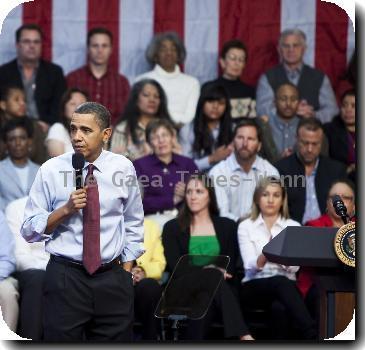US Treasury Secretary Geithner to visit Beijing, suggesting ties better amid currency dispute
By Aijaz Ansari, APWednesday, April 7, 2010
Geithner to visit Beijing amid currency dispute
BEIJING — U.S. Treasury Secretary Timothy Geithner is expected to press Beijing over its currency controls when he meets a Chinese vice premier in a sign the two sides are stepping up efforts to narrow their differences in the dispute.
Geithner was due to meet Vice Premier Wang Qishan on Thursday evening en route home from a two-day visit to India, the Treasury Department said. The surprise visit was announced just a day in advance.
The decision to hold such a high-level encounter suggested Washington and Beijing are trying to narrow their differences over currency, which threaten to overshadow cooperation on the global economy, Iran’s nuclear program and other issues.
Chinese Foreign Ministry spokeswoman Jiang Yu declined to elaborate on the agenda for the talks, saying only that Wang and Geithner would “exchange ideas on U.S.-China relations and other issues of mutual interest.”
Washington and other Chinese trading partners are pressing Beijing to ease exchange rate controls that they say keep its yuan undervalued, giving its exporters an unfair price advantage and swelling its multibillion-dollar trade surplus. Some American lawmakers want punitive tariffs on Chinese imports if Beijing fails to act.
The Obama administration delayed a report to Congress due April 15 in which it had the option of citing Beijing as a currency manipulator, a designation that could lead to a World Trade Organization complaint and possible trade sanctions.
Beijing has publicly pushed back against U.S. pressure, with the Chinese commerce minister warning that a rise in the yuan’s value would hurt exporters, who provide sizeable employment. Despite the public intransigence, a debate has also been raging among senior officials and economists about whether to stand firm or let the yuan appreciate.
Economists expect Beijing to allow the yuan to rise some time this year in order to ease strains in its own economy. A stronger yuan would increase the buying power of Chinese consumers, helping to increase domestic consumption and reducing reliance on exports.
“China can go a lot further in internationalizing its economy and promoting world growth by making its currency more flexible,” said Pieter Bottelier, an economist and former head of the World Bank’s China office. “It is in the interest of the Chinese to resume its policy of pushing toward a more flexible exchange rate, rather than in the interest of the U.S.”
Beijing tied the yuan to the dollar for decades but broke that link in 2005 and allowed it to rise by about 20 percent through late 2008. The government slammed on the brakes after the crisis hit and has held its currency steady against the greenback to help exporters compete as a plunge in global demand wiped out millions of Chinese factory jobs.
“If China’s currency would appreciate very significantly in a short time it would not be a good thing and it would raise costs for U.S. consumers,” said Xia Bin, director general of the Financial Research Institute of the Development Reform Council, a body affiliated with China’s Cabinet. He advises the government on monetary policy.
Like many Chinese experts, Xia argues that currency changes would not significantly affect trade flows, though he says Beijing should return gradually to the system it had in place after its July 2005 reform.
“We need to pursue an independent currency regime, and I believe in the long-term we will see the exchange rate tend to become more floating,” said Xia.
While the talks Thursday were seen as a positive development, analysts weren’t expecting any significant new agreement to come out of the visit.
“We’d better not be too hopeful for any breakthroughs,” said Niu Jun, professor at Peking University’s School of International Studies. “Economic and trade issues are not like political issues, which can sometimes see sudden progress.”
Niu said the currency dispute was a “long-term issue that requires long-term work.”
AP Business Writer Elaine Kurtenbach in Shanghai contributed to this report.
Tags: Asia, Barack Obama, Beijing, China, District Of Columbia, East Asia, Greater China, Hu Jintao, India, International Trade, Manmohan Singh, Mumbai, North America, Pranab Mukherjee, South Asia, United States



